Initiatives
Interdisciplinary Retreats
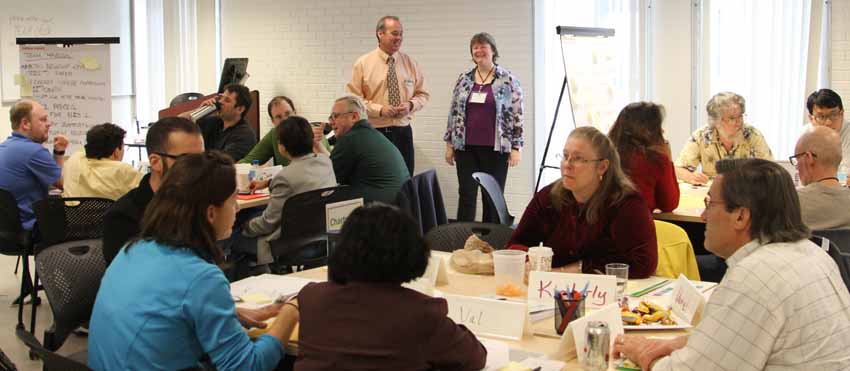
Interdisciplinary Retreats are designed to encourage discussion and collaboration within and among departments and institutions. A series of retreats and more focused follow-up projects will focus on curriculum, pedagogy, and career awareness in the Science, Technology, Engineering, and Mathematics (STEM) gateway courses. The goal of these retreats is to incorporate evidence-based teaching practices in course redesign and to integrate content across disciplines.
Past Interdisciplinary Retreats
February 4, 2017
The second STEER interdisciplinary retreat focused on the demonstration and discussion
of evidence-based pedagogies and learning science. The 2017 retreat was backward-designed
towards the goal of long-term, extensive, and sustainable change through the formation
of faculty interest groups to facilitate course redesign.
Specific objectives:
Participants will experience several evidence-based pedagogies and evaluate if these
would be appropriate and effective uses of class time in their own courses, including:
- Interactive Techniques – ex. think-pair-share
- Clickers
- Inquiry and Group work
- Team-based learning (ex. IF-AT)
- Jigsaw
- Effective questioning strategies
Following the retreat, participants will form STEER Action Teams/Interest Groups which will:
- work collaboratively to address an educational issue with evidence based practices
- be self-selected and choose the educational issue they address
- meet every other week for an hour together (facilitated by STEER)
- have the explicit goal of creating a deliverable product or improvement by the end of the semester/summer (with support from STEER)
- target implementation in fall 2017
- be incentivized (small incentive for meeting in Fall; larger for redesign proposals at end of term)
Participants: A total of 38 STEM faculty members, 29 from the University of South Florida (USF) and 9 from Hillsborough Community College (HCC), representing Chemistry, Integrative Biology, Cell Biology, Microbiology and Molecular Biology, Geosciences, Math, Physics, and Engineering.
Format: Interactive workshop and modeling of evidence-based pedagogies, particularly those suitable to large enrollment courses
Brief Agenda:
- Clickers and group work demonstration and reflection
- Interactive Techniques (CATs) and IF-AT demonstration on learning science
- Jigsaw on learning science – demonstration on the use of flipped content
- Questioning strategies
- Disciplinary discussion
- Survey of interest in pedagogies
- Group formation and feedback collection
References for articles used as flipped content in the jigsaw activity:
- Mueller, P. A., & Oppenheimer, D. M. (2014). The pen is mightier than the keyboard advantages of longhand over laptop note taking. Psychological Science.o Cepeda, N. J., Coburn, N., Rohrer, D., Wixted, J. T., Mozer,
- M. C., & Pashler, H. (2009). Optimizing distributed practice: Theoretical analysis and practical implications. Experimental Psychology, 56(4), 236-246.
- Rohrer, D. (2012). Interleaving helps students distinguish among similar concepts. Educational Psychology Review, 24(3), 355-367.
- Pekrun, R., Goetz, T., Titz, W., & Perry, R. P. (2002). Academic emotions in students' self-regulated learning and achievement: A program of qualitative and quantitative research. Educational Psychologist, 37(2), 91-105.
- Karpicke, J. D., & Roediger, H. L. (2008). The critical importance of retrieval for learning. Science, 319(5865), 966-968.The second
January 30, 2016
The first STEER Interdisciplinary Retreat included a total of 34 STEM faculty members, 26 from the University of South Florida and 8 from Hillsborough Community College. The participants engaged in lively discussions about curriculum, pedagogy, and career awareness in interdisciplinary and inter-institutional teams. A brief summary of the day is below. Click here for a list of participants.
Curriculum Discussions
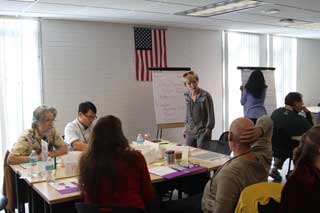
Questions to consider as a group:
1. Four year plans: identify which courses students are taking at the same time, and
when they are taking them.
2. What do students struggle with in the courses above? Are there any points of commonality
with what students find difficult in all the courses?
3. Identify what concepts occur in these courses that would be useful to emphasize.
Identify any differences in notation that could be clarified for students. Does this
information cause you to reconsider the courses you want to talk about? If so, please
add it above.
Pedagogy Discussions
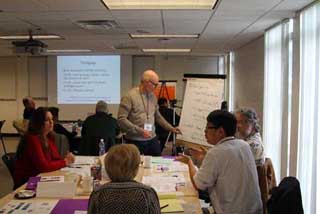
Individually: Write down your top two pedagogical strategies that you use in your classroom, then share with the group.
Questions to consider as a group:
1. Record at least three different pedagogical strategies your group came up with.
2. Why was each strategy chosen? What are its strengths? Does it have any constraints?
Discipline Breakout Discussions
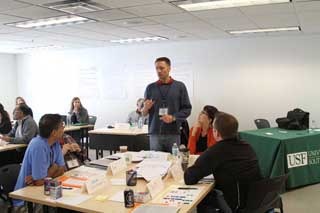
Share what you've learned so far. Strategize some ideas for what the interdisciplinary teams could look to do.
Intervention Ideas and Backward Design
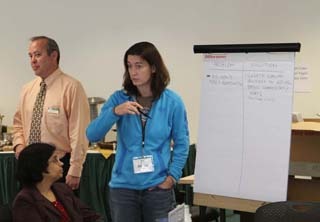
What will need to be done in the targeted courses or subject areas?
Do full backward design on one idea you've identified as important for the curriculum.
Gallery Walk
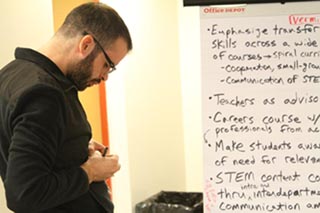
Take notes on small sticky notes as you walk through all of the team posters. Write questions, ideas, feedback on the curriculum, pedagogy and intervention ideas on the walls. Stick them directly on the posters.